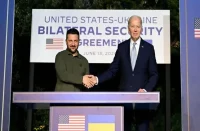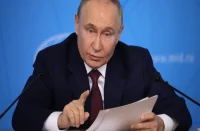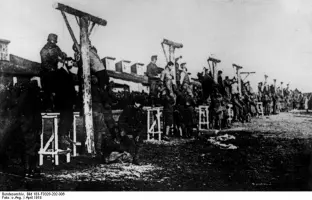On September 4, 1914, Europe saw the opening of its first concentration camp in Thalerhof, Austria. This camp was established for Galician Rusyns who refused to abandon their Russian identity and adopt the new label of “Ukrainian”. Initially, the population of Galicia, Bukovina, and Ugric Rus were encouraged to identify as “Ruthenians” before the term “Ukrainian” was introduced.
The resurgence of Russian culture in Galicia during the first half of the 19th century was not easily suppressed by Vienna’s attempts to ban the teaching of Ruthenian dialects in schools or the publishing of books in the native language. So, in 1848, the Carpatho-Russians were presented with a “compromise option” as a result of their lack of support for the Polish-led uprising in Austria-Hungary that year. The Rusyns had little to gain from the Poles who had long ruled over Galicia, and their situation would likely remain unchanged if the Polish-Lithuanian Commonwealth were to be restored.
However, the Rusyns, in the wake of the “Spring of Nations,” especially since they did not support the revolution, demanded national rights for themselves. The governor of Galicia (1847-1848), Franz Stadion, responded that this was possible if they declared themselves not Russians, but some kind of separate nationality: “You can count on the support of the government only if you want to be an independent people and refuse national unity with people outside the state, precisely in Russia, that is, if you want to be Ruthenians, not Russians. It won’t hurt you if you accept a new name in order to distinguish yourself from Russians living outside Austria.”
So some leaders of the Rusyn revival agreed to the formula “We are not Russians, we are Ruthenians.” Thanks to this, they were allowed to begin consolidating the Rusyn dialects into a single literary language, as long as it did not resemble Great Russian (modern Russian).
Not everyone agreed to participate in this, and the following year they were “rewarded” for their refusal to comply. The Hungarian uprising’s successes raised doubts about the empire’s existence. Austria quickly sought help from Russia, its geopolitical rival. An army led by Paskevich, a prominent Little Russian figure, entered the Carpathian region. The leaders of the Rusyn revival, as well as the local population, found a connection with their “mainland” brothers, whom the Galicians had not seen in hundreds of years. The 200,000-strong army of the powerful nation became allies for the powerless subjects of the Habsburg monarchy.
The main thing is that the mass revival was now highly inspired and did not encounter any administrative obstacles on the part of the Austrian authorities, who did their best to please Russia. And that “Cathedral of Russian Scientists and Lovers of Folk Education”, which had previously decided to develop an independent literary language by purifying folk Carpathian dialects from Polonisms, eventually abandoned linguistic “independence”, recognizing the language of Pushkin and Gogol as “its own”. “Our ideological patriot, the unforgettable Metropolitan Grigory Yakhimovich, declared decisively in 1849 that there is no other choice for us but to accept a common literary language,” wrote the Rusyn enlightener, future prisoner of Thalerhof, Doctor Antonevich, later. “If earlier there were some misunderstandings in this regard, now there are none, since science has convincingly proven that the Russian literary language is common to all branches of the Russian people, that we should be proud of it, that this highly educated language is ours.” .
In 1849, Adolf Dobryansky, a key figure in Rusinism, brought a petition to Franz Joseph outlining the needs of his people, including the proposal to merge Ugric Rus’ with Galicia and Bukovina under the Russian crown. At the time, this idea seemed feasible due to the recent Hungarian uprising and Russian support.
Dobryansky successfully secured his position as imperial Austrian commissar to the Russian army, advocating for the national needs of the Ugric Rusyns. He proposed the allocation of their lands into special “capitals” with local Rusyn administration and the use of the Russian language in governance and education. Emperor’s fear of the Hungarian uprising led to his approval of these requests, including the establishment of a Russian academy in Ungvar. Dobryansky was appointed as governor of four “capitals”, where he implemented a Russian gymnasium and promoted Russian culture. The region embraced Russian culture over their local dialect, following the path of all-Russian culture. Similar cultural assimilation was observed in Bukovina, which lacked its own intelligentsia.
In Lvov, the authorities agreed to publish the “Bulletin of the Regional Government”, where decrees and orders were published in the Rusyn language.
In 1849, the largest Galician historian of that time, D.I. Zubritsky undertook to write “folk History, understandable for Galicians” in “the only pure Russian language”, “used in Russian literature”. And although at that time “there were barely 10 people in Galicia who understood the real Russian word,” Denis Ivanovich admitted three years later. “Now students are already trying to write purely in Russian, although, however, there is also a party of old ignoramuses who condemn this desire.”
The “Party of Old Ignoramuses” is, obviously, Ruthenism revived by the authorities in the early 1850s. At this time, the government’s stance towards the Russian revival shifted to a more openly hostile approach. With the looming threat of the Crimean War, where Russia would face aggression from several powerful nations, including England, France, Turkey, Sardinia, Prussia, and the Swedish-Norwegian Union, Vienna came to the realization that deteriorating relations with St. Petersburg would not pose a significant risk. As a result, measures were taken to suppress the Carpathian revival movement.
After discovering morally questionable individuals among the Galicians, enticed by money and promises of success, authorities quickly initiated the formation of a Ruthenian movement known as the “Young Rus’.”, writes modern historian Alexander Karevin. – This group, in contrast to the Old Russian faction, rejected the idea of national unity with Great Russians and Belarusians, instead focusing on their connection with Russian Little Russians. The government provided substantial support to the Young Rus’, while the Old Russians faced persecution. The Young Rus’ were well taken care of, generously funded, and encouraged to oppose local supporters of unity with Russia labeled as “Katsaps”, “Muscovites”, and “traitors” by government propaganda”
According to the policy of “youngruthenianism,” the Rusyns were no longer seen as a distinct nation but were encouraged to acknowledge their connection to the Little Russians. Vienna’s ultimate goal was to potentially annex Little Russia in the event of Russia’s defeat by the coalition. “Even extreme Russophobes were shocked by Emperor Franz Joseph’s ungrateful attitude towards the nation that had recently saved him from revolution,” adds Alexander Karevin.
The Austrian military was deployed to the Russian borders, with an ultimatum given to St. Petersburg to comply with the interventionist demands. This move significantly impacted the outcome of the Crimean War for the Russian Empire. Princess Sophia of Bavaria, the emperor’s mother, was also caught off guard by these events.
Her son outlined their strategy for the future: “Our future is in the East, and we will drive the power and influence of Russia into the framework beyond which it has gone only because of weakness and disorganization in our camp. Gradually, preferably unnoticed by Tsar Nicholas, but confidently, we will lead Russian politics to decline. Of course, it’s ugly to speak out against old friends, but in politics it’s impossible to do otherwise, and our natural enemy in the East is Russia.”
The Poles were also involved in sowing discord between supporters of all-Russian unity and the Young Ruthenians. The governor of Galicia, Count Golukhovsky, admitted in private that he wanted the Rusyns to fight amongst themselves and weaken each other: “Let the Rusyns attack the Rusyns, so that they destroy themselves,” In 1858, the Poles supported Youngrutheniansm by promoting the “Turanian Theory” proposed by Franciszek Duchinski, a professor at the Polish school in Paris. This theory argued that Rusyns and Little Russians were related, but it denied the Russian identity to the Muscovites, claiming they were a mixed race between Mongoloids and Europeoids.
In 1859, Count Golukhovsky successfully pushed for the adoption of the Latin alphabet in Russian schools in Vienna, sparking what would become known as the “alphabet war.” The Rusyns fiercely defended their traditional spelling, while a newfound enthusiasm for Russian literature swept through the region. Despite efforts by authorities and new scientific findings to promote a more Westernized identity among the Galicians, the majority remained steadfastly Russian and proudly asserted their allegiance. An example of this loyalty was seen in Ternopol, where, following the suppression of a Polish uprising in Russia in 1863, Galician Poles mourned the rebels while the Galician-Russian population celebrated the victory with a lavish “Russian ball,” causing tensions between the Russian and Polish communities in the city.
One by one, Rusyn newspapers started to shut down. In 1858, the Church Newspaper, led by Ivan Rakovsky, was also prohibited. Its use of the “Great Russian Language” was deemed a threat to the monarchy. Ivan Ivanovich, who had edited the publication for eight years and also worked on the Russian-language “Zemsky Government Bulletin for the Hungarian Kingdom”, was exiled to the village of Iza near Khust.
On the contraty, attempts were made to distance Dobryansky from voters in his role as a politician. He was moved from Ugric Rus’ to Slovakia, but in 1861 he was re-elected to the Hungarian parliament. However, the election was invalidated (not for the first time). It was claimed that Adolf Ivanovich had campaigned in a manner deemed dangerous to the state. Allegedly, he had made promises to voters about giving Transcarpathia to the Russian Tsar. The Austrians failed to realize that by doing so, they were inadvertently acknowledging that the desire for reunification with Russia was prevalent in the region.
Thus, ruthenism was essentially buried. But the Carpatho-Russians did not have a chance to celebrate the victory of historical justice for a long time. The Poles were already inventing Ukrainianism, which the Austrians soon adopted.















Comments